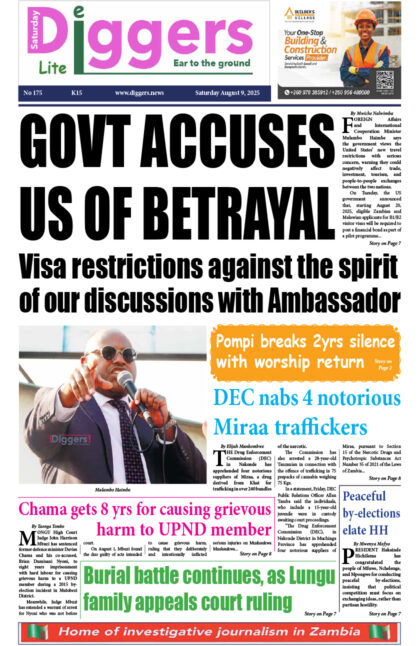The World Health Organisation (WHO) has donated personal protective equipment against the Ebola virus to the Ministry of Health to support emergency response activities after Ebola cases were reported in the neighboring Democratic Republic of Congo.
And the Ministry of Health has launched the first-ever mobile survey on non-communicable diseases using mobile phone technology.
Speaking at the Ministry of Health during a briefing today, WHO officer in-charge Dr Mary Bwalya, who was representing WHO country representative Dr Jacob Mufunda, said adequate supplies and equipment were key to preventing Ebola.
“Allow me to reiterate WHO’s commitment to supporting the health sector strengthen its capacity to prevent, respond efficiently and timely to outbreak in the country. The Ebola outbreak in West Africa was a wake-up call for all to make health systems more resilient to respond efficiently and timely to outbreaks. This entails continued efforts to improve capacities and systems for stronger surveillance for outbreak prone diseases, better preparedness and responses to outbreaks. In the event of an outbreak, it is essential that in addition to the skilled health worker, adequate supplies and equipment are readily available for use. The Ministry of Health’s continued effort in improving the health system at all levels should be commended and supported by all,” Dr Bwalya said.
“In our continued effort to support the Ministry of health deliver efficient and timely health care services to the people of Zambia and to strengthen the capacity to respond to health threats, the World Health Organization is today making a donation of assorted supplies to support emergency response activities including Ebola surveillance.”
In accepting the donation, Minister of Health Dr Chitalu Chilufya said it was timely.
“WHO remains a key ally of government in ensuring that our health systems are strengthened that we expand health services to our people and as part of our public health systems, it’s very important to realize that disease surveillance and disease intelligence is key. Now with the outbreak of Ebola in Congo, this donation is very timely. We are saying we have escalated our surveillance, the number of people in the border crossing points, port health services will be strengthened with this donation. With the support that we are getting today, we are taking our surveillance system to another level,” Dr Chilufya said.
“We have encouraged that all the people that are crossing into the country should be using the designated points to ensure that we are able to offer port health services that are available in the country. This is the best way to protect international travelers and the public in Zambia. And it is in line with the national health regulations. We want to request all stakeholders to bench-mark the WHO and the UN family in general in holding hands with government to ensure that we strengthen our public health systems and protect the public from diseases.”

Among the equipment that was donated were 1,500 examination gloves, 1000 Nitril gloves, 300 PPE (Tyvek superior protection), 250 Kalim respiratory mask, and 1,600 outbreak response bags.
And Dr Chitalu launched the first-ever mobile survey on non-communicable diseases using mobile phone technology.
He said the survey was the first of its kind in the world and that it would be a two-way communication survey using a multi-model technology platform.
“This will be a two-way communication survey using a multi-model technology platform that will elicit responses from the general public on risk factors that predispose citizens to NCDs such as cardiovascular diseases, diabetes, cancers and chronic respiratory diseases,” Dr Chilufya said.
He said necessary approvals from ZICTA and the University of Zambia were already obtained in order to carry out the survey thoroughly.
“The necessary approvals in order to carry-out this survey have been obtained from the Ministry of Communications and Transport through ZICTA and the University of Zambia Biomedical Research Ethics Committee (UNZABREC). Confidentiality shall be maintained throughout the survey,” he added.
He also said his Ministry was ready to carry out survey to implement the e-Governance and Smart Zambia, as directed by President Edgar Lungu.
“In line with the directive given by His Excellency, the President of the Republic of Zambia, Mr. Edgar Chagwa Lungu to implement e-Governance and Smart Zambia, the Ministry of Health is now ready to carry out this important survey. With the re-organization of the Ministry of Health, we would like to ensure that we prevent NCDs in our communities by knowing which risk factors are prevalent. The common identified risk factors include: Tobacco use; Harmful use of alcohol; Unhealthy diets such as high salt intake and inadequate consumption of fruits and vegetables; and Lack of physical activities,” said Dr Chilufya.























